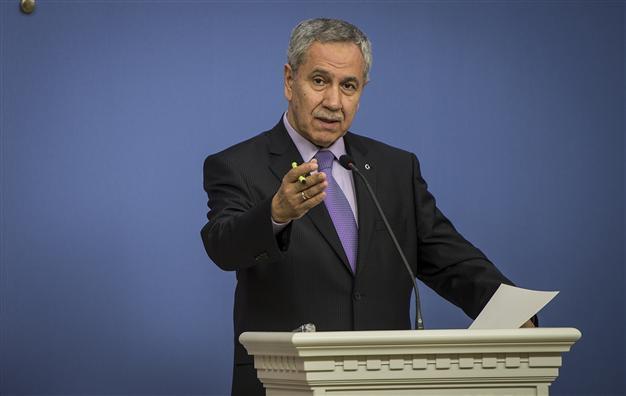Turkish gov’t slams HDP co-chair for hindering Kurdish peace process
ANKARA

AA Photo
The government has publicly pointed the finger at Peoples’ Democratic Party (HDP) Co-Chair Selahattin Demirtaş over obstacles in the peace process.Speaking at a press conference after a cabinet meeting late on March 2, Deputy Prime Minister Bülent Arınç, also the spokesperson for the government, described Demirtaş’s stance on the ongoing resolution process as “not constructive.”
“I am telling you one thing, which my friends both inside and outside of the HDP would appreciate too: Whatever obstacle has so far been raised in front of the resolution process, among those responsible for these obstacles, the primary one is Selahattin Demirtaş,” Arınç said,
“I don’t intend to pronounce his name or speak about this from now on,” Arınç added.
He recalled how the faces of all the participants at a joint press conference held in Istanbul on Feb. 28 - Deputy Prime Minister Yalçın Akdoğan, Interior Minister Efkan Ala, ruling Justice and Development Party (AKP) Deputy Parliamentary Group Chair Mahir Ünal, HDP Istanbul deputy Sırrı Süreyya Önder and the HDP’s two deputy parliamentary chairs, İdris Baluken and Pervin Buldan - reflected “pleasure.”
“But look at the facial expression of Mr. Demirtaş just one hour later [after the joint press conference]. It showed distress, anger and hatred,” Arınç said, referring to a statement delivered by Demirtaş in Antalya on Feb. 28 within hours of the press conference in Istanbul.
In Antalya, Demirtaş accused Arınç of “doing his best to put an end to the resolution process,” and advised Arınç to resign from his post if he is so “intolerant of the peace process.”
Meanwhile, Prime Minister Ahmet Davutoğlu, speaking in an interview broadcast late on March 2, also touched on the same issue.
“If you look carefully, inside the HDP there is a difference between comments of the HDP deputies who made the statement [on Feb. 28] and Selahattin Demirtaş, who later made a comment,” Davutoğlu said in an interview with broadcasters ATV and A Haber.
He also suggested an “inconsistency” between Demirtaş’s words and deeds when it came to the issue of maintaining peace.
Davutoğlu recalled the Oct. 6-7, 2014 demonstrations by Kurdish citizens against Ankara’s perceived inaction toward Syrian Kurds besieged by jihadists in the Syrian border town of Kobane.
“If the Oct. 6-7 incidents hadn’t taken place we would have arrived at the point we reached today by November at the latest,” he said.
When asked whether he held Demirtaş responsible for the incidents, the prime minister said Demirtaş “provoked” the street violence.
While criticizing Demirtaş, Arınç, meanwhile, mentioned the names of a number of key veteran figures of the Kurdish political movement such as Hatip Dicle, Leyla Zana, Ahmet Türk, Sırrı Sakık and Selim Sadak, describing them as “very positive and important supporters” of the process.
“We owe them a debt of gratitude. Because as persons who have suffered they regard the current point which we have arrived at to be very important for Turkey,” he said.
















